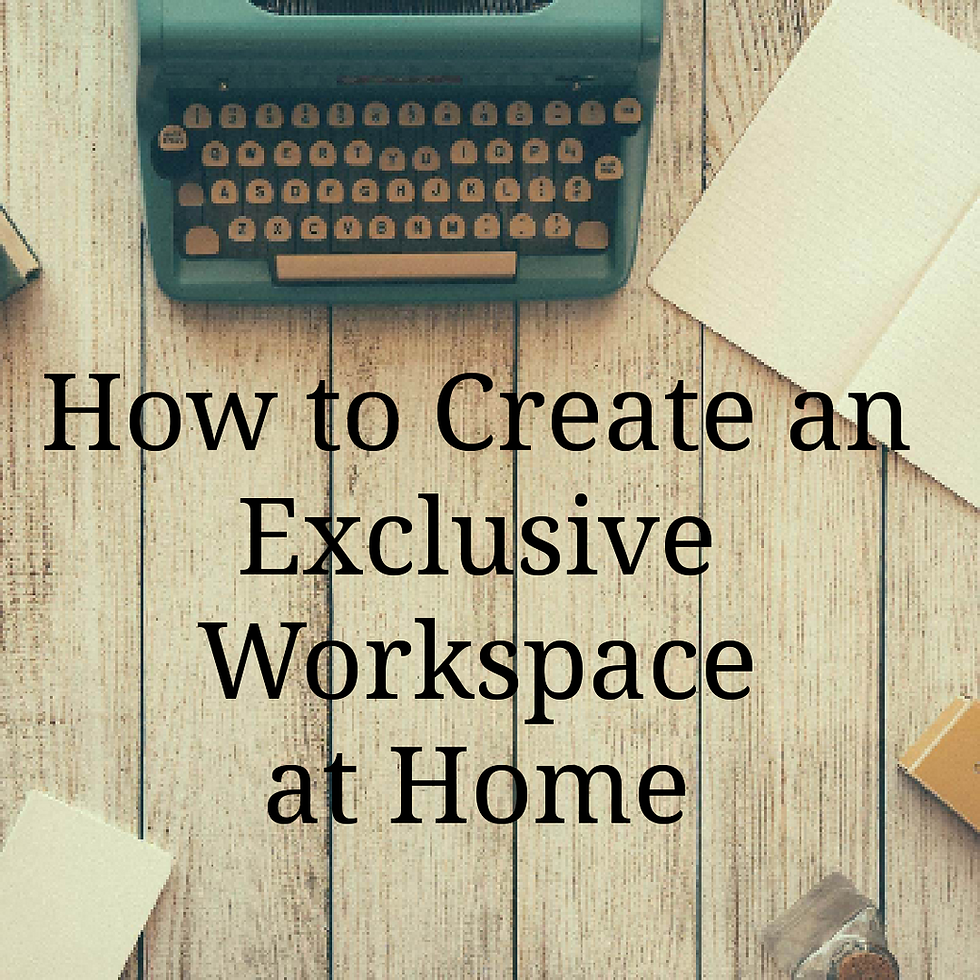How to Create an Exclusive Workspace at Home
- Crystal

- May 10, 2021
- 4 min read
Updated: Jun 13, 2021

There's no way around it. If you're going to work at home, you should consider WHERE you will work inside the premises of your humble abode. Where should you work, and why does it matter? You're a writer, so technically, you can work anywhere you prefer. However, having an exclusive workspace at home benefits you in more ways than one. Check it out:
1. It's good for the psyche. If you think about it, you don't get much accomplished when you work where you play. It's difficult to break out of that relaxed mode and shift gears. If you draw a boundary by having a distinct space for work, it is easier to get down to business. You are less likely to be distracted by the television or the dirty dishes if you are in a completely different area of the house. Unless you're injured and need to sit on the couch, head for your zoned-off workspace.
2. It's tax-deductible. Who doesn't want to shave off some of their taxes? I certainly do. Even if you don't have an extra room, the area you consider to be your office space qualifies. It doesn't matter if it's only a 5x5 section. It is still considered eligible to be written off in your taxes IF the area is used solely for business. This also includes purchases such as a computer, printer, other office supplies, some of your electric bill, phone bill, etc. You get the idea. You can find more information under IRS Publication 587, which you can find here: Business Use of Your Home, 2016 Publication 587 - Internal Revenue Service
Side note: It's imperative to keep your records organized. When it comes time to file your taxes, your life becomes much easier because you're not stressed out trying to find everything. I recall a former client who had a terrible habit of tossing their receipts into multiple bags. Then, when it came time to claim expenses, guess who had to organize every single stinking receipt?? Yeah, it was me. It was a disaster, to be honest. Don't be THAT person. If you don't feel like you can keep everything organized, hire someone to help you with your files and receipts.
3. Make it comfortable. You're going to spend hours working in this room or corner of your home. Does it have a nice window, with natural sunlight streaming in? Sitting in the dark encourages the production of melatonin. If you're sleepy, your production levels will be down. Sunlight is an excellent way to keep sleepiness at bay, boosting your energy levels.
Is your desk comfortable? Do your wrists hurt from being at the desk after a while? Perhaps a pad to support your wrists could help. Did I mention you should buy a comfortable chair? You can't sit in a chair that kills your back after 30 minutes.
4. Office Supplies. Make sure you have everything you need to be productive. Don't forget a filing cabinet or container to keep your paperwork in order! I recommend making a list, then going through it to ensure you have everything you need. This way, you can set up your exclusive workspace and get down to business as soon as possible.

5. Your space. The size of your home determines the size of your workspace. Pick a room or single spot away from distractions such as the television, kids, pets, etc. If you have an additional room that could serve as an office, you will have privacy and shut the door to muffle any sounds.
However, don't feel discouraged if you only have a spot on the dining room table with noise bustling all around you. With enough determination, you can make it work even if you don't have a private area. There are so many creative ways to carve out space in even the smallest of apartments. You can utilize a small, unused corner of your home, bedroom, garage, etc. Some even stand at their breakfast bars because standing helps them focus better.
6. Remove the clutter. Clutter creates needless distractions and can make it difficult to focus. If you have drawers full of stuff, clear them out a little at a time. You don't have to do it all at once. On top of that, develop better habits to keep your workspace organized to avoid the clutter from building up.
7. Set specific work hours. Along with creating your workspace, determine and protect your schedule. When it's time to work, shut your door, and let everyone know they're not to disturb you unless someone's dying. Emergencies only! This extends to your husband/wife/significant other. If you can't escape the noise because you live with roommates, throw on some headphones and listen to white noise or music.

8. Motivation board. Finally, read inspirational quotes, like the one I've included here, every day. You can even pin motivational pictures to a board or tape them to a wall. These can include novels, a house, or motivational sayings. Choose the things that get you excited about writing.
Remember, it's not necessarily the size of the space as much as creating a functional workspace for work and creative writing. It's your space. Make it work for you and not against you. Keep it simple.




Comments